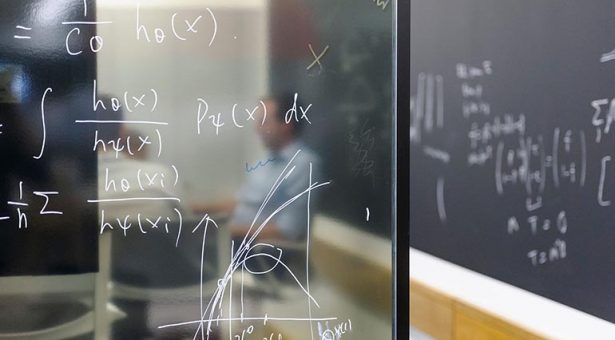£600k Machine Learning collaboration to supercharge data-driven science

A collaboration between the Norwich Bioscience Institutes and The Alan Turing Institute will enhance the ways machine learning and artificial intelligence are applied to life science research.
With biological research becoming increasingly data rich, the collaboration will help identify new ways to exploit this wealth of information and accelerate advances in understanding. The Norwich Bioscience Institutes – including the Earlham Institute, the John Innes Centre, Quadram Institute and The Sainsbury Laboratory – have teamed up with The Alan Turing Institute in a £600,000 project to kickstart collaborations that will employ machine learning and artificial intelligence.
Half of the funding comes from The Alan Turing Institute’s ‘AI for Science and Government’ Strategic Priorities Fund award, with the other half coming from a strategic award from the Biotechnology and Biological Sciences Research Council (UKRI-BBSRC).The funding will support up to six year-long research posts who will work together in a cross-institute cohort to expand the application of machine learning and artificial intelligence to several key areas, which may include:
- Identifying cell types using a deep neural network
- Characterising the circadian rhythms of plants
- Understanding how genetic changes affect plant structure, influencing crop yield
- Finding the weapons used by plant pathogens to invade plants
As technologies for capturing information – from DNA sequences through to high resolution images – become ever cheaper and more widely available, so do the reams of data associated with that. Making sense of huge datasets can create bottlenecks in research projects and, importantly, discoveries. Machine learning offers a promising route into not only exploring that data, but also helping us to find hidden patterns and new hypotheses that we had never previously considered.
The Alan Turing Institute believes that data science and artificial intelligence will change the world, and part of that vision includes their Data Science At Scale research programme. This aligns strongly with the mission of the Earlham Institute, who are contributing to solving global challenges by applying data driven methods, and host the UK National Capability in computational infrastructure.
“Data driven science has the potential to improve the lives of hundreds of millions worldwide,” said Professor Neil Hall, Director of Earlham Institute and lead PI on the bid. “Over the last ten years our ability to generate vast datasets has increased rapidly, and this collaboration will allow us to better use that information for public good. To work alongside The Alan Turing Institute, with all their expertise in machine learning, is fantastic for the future of UK life science research.”
Professor Jonathan Rowe, Programme Director of Data Science For Science at The Alan Turing Institute, said that “this is a significant new collaboration for the Turing which offers new opportunities for advancing data-driven science. To be able to combine our expertise in machine learning and artificial intelligence with the expertise of the Norwich Biosciences Institutes is an exciting prospect and will allow us to help solve real-world problems in bioscience”
Professor Anthony Hall, Head of Plant Genomics at the Earlham Institute, said: “We’re really pleased to start this collaboration with a like-minded institute, pushing the boundaries of what’s possible with data-driven science. It’s exciting to think of the fundamental and applied work that will benefit from this.”
Professor Richard Morris, Group Leader in Computational and Systems Biology at the John Innes Centre, said: “Computational approaches such as AI and ML also have tremendous scope for advancing hypothesis-driven research by removing the limitations imposed by more traditional methods. Learning patterns from data can automate, reduce bias, and massively speed up key steps in research and, importantly, suggest connections that may have escaped the human mind. ATI is a world leader in driving these key computational developments and we are delighted to have won this partnering award with them to develop collaborations and boost these extremely powerful and exciting techniques within the Norwich Bioscience Institutes.”
The Institutes have already collaborated on machine learning projects with real world applications. Scientists at the Earlham Institute and John Innes Centre have recently worked together on SeedGerm, an automated tool that analyses images to help crop breeders monitor seed germination rates
.The Alan Turing Institute has collaborated with researchers from the John Innes Centre in using AI methods to understand gene expression patterns in brassicas, and to explore complex new biochemical synthesis pathways. In another project, Earlham and Quadram Institute researchers have developed machine learning algorithms to understand complex interactions in the gut, some of which are being applied to the current COVID pandemic.
Furthermore, an international aquaculture development project has seen EI scientists contribute machine learning to an app which can tell apart native and farmed tilapia species.
For more information, please contact: Peter Bickerton – Scientific Communications and Outreach Manager, Earlham Institute (EI) +44 (0)1603 450 994
